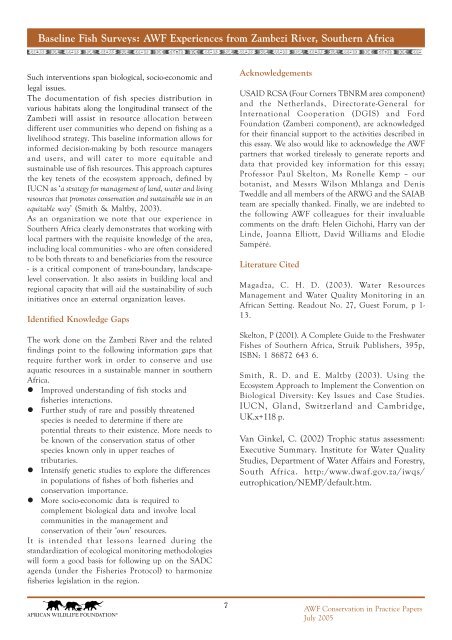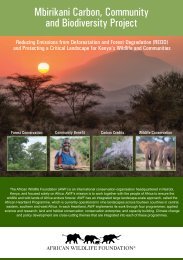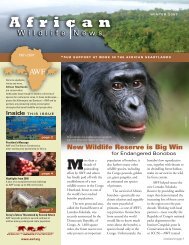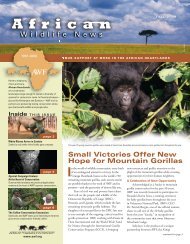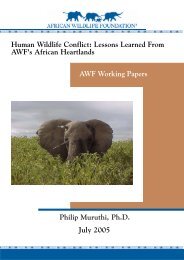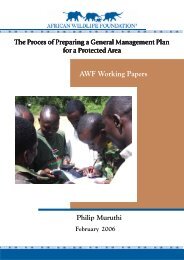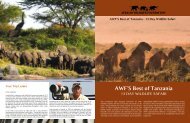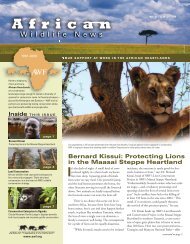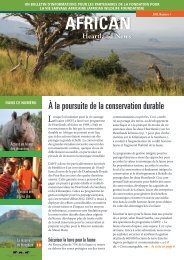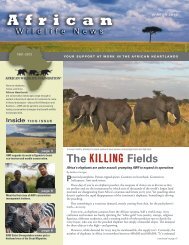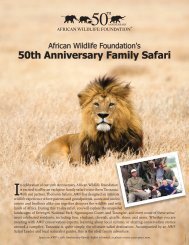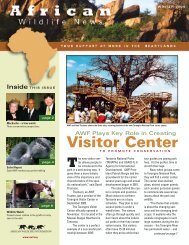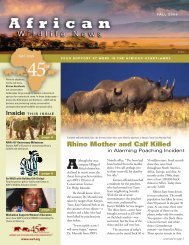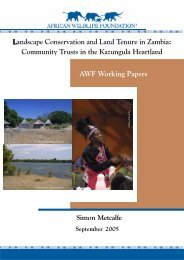Baseline Fish Biodiversity Surveys - African Wildlife Foundation
Baseline Fish Biodiversity Surveys - African Wildlife Foundation
Baseline Fish Biodiversity Surveys - African Wildlife Foundation
- No tags were found...
Create successful ePaper yourself
Turn your PDF publications into a flip-book with our unique Google optimized e-Paper software.
<strong>Baseline</strong> <strong>Fish</strong> <strong>Surveys</strong>: AWF Experiences from Zambezi River, Southern AfricaSuch interventions span biological, socio-economic andlegal issues.The documentation of fish species distribution invarious habitats along the longitudinal transect of theZambezi will assist in resource allocation betweendifferent user communities who depend on fishing as alivelihood strategy. This baseline information allows forinformed decision-making by both resource managersand users, and will cater to more equitable andsustainable use of fish resources. This approach capturesthe key tenets of the ecosystem approach, defined byIUCN as ‘a strategy for management of land, water and livingresources that promotes conservation and sustainable use in anequitable way’ (Smith & Maltby, 2003).As an organization we note that our experience inSouthern Africa clearly demonstrates that working withlocal partners with the requisite knowledge of the area,including local communities - who are often consideredto be both threats to and beneficiaries from the resource- is a critical component of trans-boundary, landscapelevelconservation. It also assists in building local andregional capacity that will aid the sustainability of suchinitiatives once an external organization leaves.Identified Knowledge GapsThe work done on the Zambezi River and the relatedfindings point to the following information gaps thatrequire further work in order to conserve and useaquatic resources in a sustainable manner in southernAfrica.• Improved understanding of fish stocks andfisheries interactions.• Further study of rare and possibly threatenedspecies is needed to determine if there arepotential threats to their existence. More needs tobe known of the conservation status of otherspecies known only in upper reaches oftributaries.• Intensify genetic studies to explore the differencesin populations of fishes of both fisheries andconservation importance.• More socio-economic data is required tocomplement biological data and involve localcommunities in the management andconservation of their ‘own’ resources.It is intended that lessons learned during thestandardization of ecological monitoring methodologieswill form a good basis for following up on the SADCagenda (under the <strong>Fish</strong>eries Protocol) to harmonizefisheries legislation in the region.AcknowledgementsUSAID RCSA (Four Corners TBNRM area component)and the Netherlands, Directorate-General forInternational Cooperation (DGIS) and Ford<strong>Foundation</strong> (Zambezi component), are acknowledgedfor their financial support to the activities described inthis essay. We also would like to acknowledge the AWFpartners that worked tirelessly to generate reports anddata that provided key information for this essay;Professor Paul Skelton, Ms Ronelle Kemp – ourbotanist, and Messrs Wilson Mhlanga and DenisTweddle and all members of the ARWG and the SAIABteam are specially thanked. Finally, we are indebted tothe following AWF colleagues for their invaluablecomments on the draft: Helen Gichohi, Harry van derLinde, Joanna Elliott, David Williams and ElodieSampéré.Literature CitedMagadza, C. H. D. (2003). Water ResourcesManagement and Water Quality Monitoring in an<strong>African</strong> Setting. Readout No. 27, Guest Forum, p 1-13.Skelton, P (2001). A Complete Guide to the Freshwater<strong>Fish</strong>es of Southern Africa, Struik Publishers, 395p,ISBN: 1 86872 643 6.Smith, R. D. and E. Maltby (2003). Using theEcosystem Approach to Implement the Convention onBiological Diversity: Key Issues and Case Studies.IUCN, Gland, Switzerland and Cambridge,UK.x+118 p.Van Ginkel, C. (2002) Trophic status assessment:Executive Summary. Institute for Water QualityStudies, Department of Water Affairs and Forestry,South Africa. http:/www.dwaf.gov.za/iwqs/eutrophication/NEMP/default.htm.7AWF Conservation in Practice PapersJuly 2005


